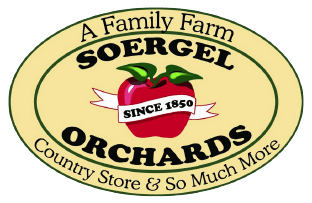IPM Information
- What is IPM farming?
IPM, or Integrated Pest Management, is the sustainable method of farming Soergel’s has used for many years. In the past, farmers approached pest management by spraying before any pest problems were present. With IPM farming, every farming method, option, and theory is considered (both conventional and organic), and spray materials are applied only when the benefits outweigh the costs and yield the best possible results as well as the most value from the product. We use the IPM method as opposed to strictly following organic farming methods because we feel it is the most well-rounded, beneficial to the land & produce, and results in the best product. Many people assume “organic” means the product is pesticide free, but this is not true. Organic farmers often spray as much or more pesticides than other farmers. The spray materials they use are considered “natural,” even though they may be just as potent as non-organic materials. The pesticides eliminate insect, disease, and weed pest problems, but do not necessarily eradicate all pests. All pest management options are considered, including natural, biological, cultural, and chemical methods. Regular inspection (monitoring) of the plants and crops deter-mine whether pests are approaching damaging levels; the mere presence of a pest is not enough reason to apply a control measure. The number of pests present must be sufficient to cause enough harm to pay for the control measure. IPM means treating only when pests reach or exceed the “action threshold” (the point where the number of pests justifies action).
- What we look for:
- The presence of plant diseases or insect pests (do they reach the action threshold?)
- Symptoms or damage to the plant (do they differ from a normal plant?)
- Other insects (are there beneficial insects present that may be natural enemies of the pest?)
- Weather conditions (temperature, precipitation, wind speed)
- Benefits of monitoring include:
- A greater awareness of pest activity, including changes in pest populations
- Up-to-date information on the health of the plants
- Data can be used to compare pest outbreaks from season to season
- Early detection of pest problems, resulting in the availability of more management options
- Benefits of IPM farming:
Fewer pesticide applications, at reduced rates, using the safest possible materials with the latest research. This minimizes the dangers associated with pesticide applications, including accidents, drift, and effects on non-target organisms and wildlife.
Delay of pest resistance: Applying the same pesticide over and over again results in insect, disease, and weed pests that are no longer killed by the formerly fatal pesticide. By choosing from all possible control methods, including biological pesticides, beneficial organisms, and rotating pest control methods, resistance can be delayed or prevented. This preserves the effectiveness of existing pesticides, and helps reduce costs for everyone.
Limiting pesticide applications to essential uses- while using the least toxic materials whenever possible- helps preserve the environment.
- Weather and IPM
The right weather information helps to manage work and spray schedules in order to reduce costs and maximize results. No one can change the weather, but we can learn how to make the most of the weather that we do have. Some weather effects on plant production are obvious: Frost (often experienced in May), drought (the past several summers), hail, high winds and excessive heat can cause plant stress, or even destroy an entire crop or planting. Less obvious effects include the weather’s indirect impact on plants via its effects on insect, disease, and weed pest development. By using weather reports and forecasts, we can time and minimize necessary sprays to have the most positive impact possible to result in the most consistent, safe, highest-quality produce available.
We pledge to continue to produce the safest, healthiest fruits and vegetables possible… for your family, and for ours. Your family’s food is our family’s business- we appreciate your patronage, support, and trust.


